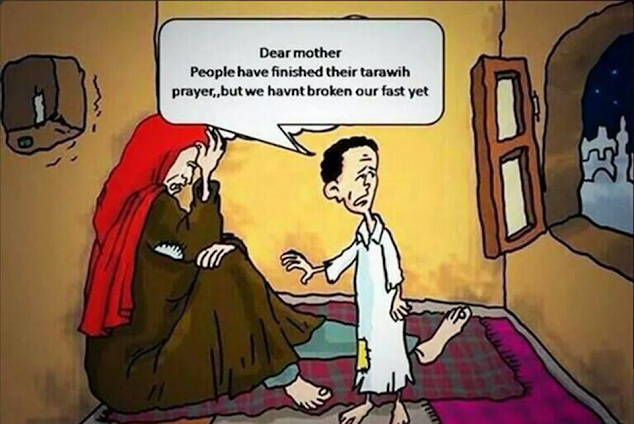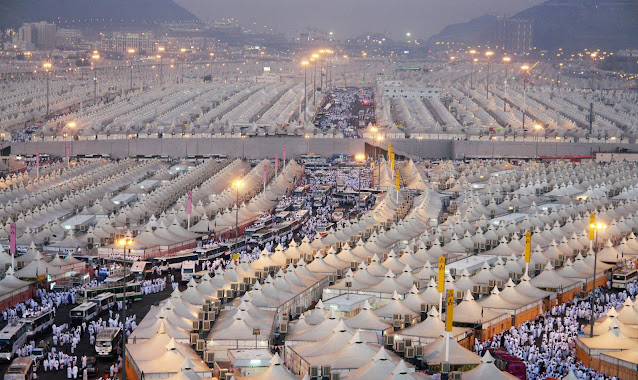Laylatul-Qadr
Every year during Ramadhan, Muslims would look forward for a night called Laylatul-Qadr, in which, those who observe the night by performing prayers, reading the Quran, chanting zikhir or any other religious rituals or worshipping, shall be rewarded with blessings, better than a thousand month. Muslims believed that Surah Al-Qadri (97) was dedicated to this night event as testament to the validity of this claim. The night was said to come filled with blessings and mercy, better than a thousand months, while all sins are forgiven.
The date of Laylatul-Qadr is very much rooted in the Hijri Calendar month of Ramadhan, implying the Lord of the Universe is subscribing to the Arabic calendar. Please be reminded that the Hijra Calendar is a continuation of the Arabic calendar that had served the Arabs since pre-Islamic era, identified as Jahili Calendar. And for this reason, we shall explore the relevance of Surah Al-Qadr, from the Quranic perspective, whether it has any relation to a night called Laylatul-Qadr.
When is Laylatul-Qadr?
The actual date of this night is unknown and has been the subject of speculation by scholars with differing opinions. The Prophet was said to have been shown when the actual date of Laylatul-Qadr, but had forgotten it because he was distracted by some qualrellings and forgotten about it.
Volume 3, Book 32, Number 235 : Narrated by Abu Said Al-Khudri - Allah's Apostle used to practice Itikaf (in the mosque) in the middle third of Ramadan and after passing the twenty nights he used to go back to his house on the 21st, and the people who were in Itikaf with him also used to go back to their houses. Once in Ramadan, in which he practiced Itikaf, he established the night prayers at the night in which he used to return home, and then he addressed the people and ordered them whatever Allah wished him to order and said, "I used to practice Itikaf for these ten days (i.e. the middle 113rd but now I intend to stay in Itikaf for the last ten days (of the month); so whoever was in Itikaf with me should stay at his place of seclusion. I have verily been shown (the date of) this Night (of Qadr) but I have forgotten it. So search for it in the odd nights of the last ten days (of this month). I also saw myself (in the dream) prostrating in mud and water." On the night of the 21st, the sky was covered with clouds and it rained, and the rain-water started leaking through the roof of the mosque at the praying place of the Prophet . I saw with my own eyes the Prophet at the completion of the morning prayer leaving with his face covered with mud and water.
Volume 3, Book 32, Number 240 : Narrated by 'Ubada bin As-Samit - The Prophet came out to inform us about the Night of Qadr but two Muslims were quarreling with each other. So, the Prophet said, "I came out to inform you about the Night of Qadr but such-and-such persons were quarreling, so the news about it had been taken away; yet that might be for your own good, so search for it on the 29th, 27th and 25th (of Ramadan).
The general belief of the occurrence of Laylatul-Qadr is within the last ten nights of Ramadhan.
Narrated by 'AishaAllah's Apostle used to practice Itikaf in the last ten nights of Ramadan and used to say, "Look for the Night of Qadr in the last ten nights of the month of Ramadan."
Sahih Bukhari Volume 3, Book 32, Number 237
(also Sahih Muslim 1174)
However, this was narrowed down to the odd numbered nights;
Narrated by 'AishaAllah's Apostle said, "Search for the Night of Qadr in the odd nights of the last ten days of Ramadan."
Sahih Bukhari Volume 3, Book 32, Number 234
According to Ibn Abbas, it could be on the 21st, 23rd or 25th nights.
Narrated by Ibn AbbasThe Prophet said, "Look for the Night of Qadr in the last ten nights of Ramadan ,' on the night when nine or seven or five nights remain out of the last ten nights of Ramadan (i.e. 21, 23, 25, respectively)."
Sahih Bukhari Volume 3, Book 32, Number 238 (also 239)
While 'Ubada bin As-Samit said it was on 25th, 27th and 29th nights.
Narrated by 'Ubada bin As-SamitThe Prophet came out to inform us about the Night of Qadr but two Muslims were quarreling with each other. So, the Prophet said, "I came out to inform you about the Night of Qadr but such-and-such persons were quarreling, so the news about it had been taken away; yet that might be for your own good, so search for it on the 29th, 27th and 25th (of Ramadan).
Sahih Bukhari Volume 3, Book 32, Number 240
As we can see, there is no agreement on the exact date from the authentic hadith. Some contradict each other on the sayings from the same the Prophet that leave us speculating and making guesses whether the night before was the blessed night.
Even if we think we saw the signs as speculated by scholars, we can never be sure of it and it will still remain as a guess. So we will repeat the cycle without really knowing of any truth in it.
https://aboutislam.net/reading-islam/living-islam/5-authentic-signs-of-laylatul-qadr/
Scholars reasoning for guessing Laylatul-Qadr.
Some scholars argued that the reason the actual date was not disclosed was to make the ummah strive for the bounty during the last 10 nights, in the hope of obtaining the most sought after blessings during the month of Ramadhan.
As Ibn Qudamah al-Maqdisi (d. 620 H) writes:
God has concealed this night from the ummah so that they may strive in seeking it and performing worship throughout the month in the hopes of catching it. Similarly, He concealed the hour of special acceptance on Friday so that one would increase in their supplications throughout the day, and He concealed His Greatest Name (ism al-a’dham) amongst His Divine Names and His Pleasure with acts of obedience so that people would strive for them. And He concealed an individual’s lifespan and the Hour [of the Day of Judgment] so that humanity would continuously strive in good deeds, being heedful of them.
Ibn Qudamah,al-Mughni (Dar `Alam al-Kutub), vol. 4, p. 453.
Annual Lottery for Muslims?
This notion that God is making Muslim to speculate and taking chance during the last ten nights is contradictory to what is being mentioned in the Quran on the game of chance - 2:219 & 5:90-91. Is this not like hosting an annual lottery for Muslims that one can just become indifferent towards making good works, for the rest of the year, knowing that he, or she already had a full pocket of blessings for the rest of his or her life?
The only problem with this “reward”, is that, no one has ever claimed to have secured such blessings, even if the person had observed the night diligently every last ten nights, every year. No one had ever come forward and admit with truth, that he or she had obtained such blessings. And yet, every year, most Muslims, without second thoughts, would spend their nights with great hope of achieving it without any tangible results as proof.
The Wrong Calendar.
From the previous parts of this series on the Hijra Calendar, we have shown that Muslims the world over are following a flawed calendar that is not the same as the original calendar observed by the Prophet. Muslims today are not fasting in the actual season of Ramadhan, which it was named after. Some thinking Muslims are aware of the flaws in the calendar, but has remained clueless in trying to seek a solution for a correct understanding. But Muslims general ignorance on the glaring fault in the calendar is not surprising, when they are not even able to realize that their annual night rituals had not presented any perceivable substance or outcome.
So here we have a religious event that not only contradict the Quran, but also exploiting a flawed calendar. How much further distort one need to go?
Do we really think God is playing dice?
The Quran is against Conjectures and Guessings.
The Quran has warned us of such predicament, based on assumptions and guessings.
6:116 And if you obey most of those in the earth they will mislead you from the way of Allah. Not they follow except THE ASSUMPTION (al-zana), and not they do except GUESS (yakhrusūna).
10:36 And not follow most of them except ASSUMPTION (zannan). Indeed, THE ASSUMPTION (al-zana) does not avail against the truth anything. Indeed, Allah (is) All-Knower of what they do.
10:48 Will say those who associate partners with Allah, "If had willed Allah, not we would have associated partners with All and not our forefathers and not we would have forbidden of anything." Likewise denied those who from were before them until they tasted Our wrath. Say, "Is with you of any knowledge then produce it for us? Not you follow except THE ASSUMPTION [al-ẓana], and not you do but GUESS [takhruṣūn]",
10:66 No doubt! Indeed, to Allah belongs whoever is in the heavens and whoever is in the earth. And not follow those who invoke from other than Allah, partners. Not they follow but THE ASSUMPTION (al-zana) and not they but GUESS (yakhrusūna).
53:23. Not they are except names you have named them, you and your forefathers, not has sent down Allah for it any authority. Not they follow except ASSUMPTION [al-ẓana] and what desire their souls. And certainly has come to them from their Lord the guidance.
53:28 And not for them about it any knowledge. Not they follow but THE ASSUMPTION [al-ẓana]. And indeed, THE ASSUMPTION [al-ẓana] does not avail against the truth anything.
But Muslims are doing just that, and had been convinced by scholars that there are easy ways to gain certain things, such as forgiveness and rewards by simply reciting certain verses or performing certain rituals. Similarly, to gain blessings worth more than a thousand months is just a great deal too good to be ignored . This is not the way of Allah.
So whatever happened to accountability?
According to the Quran, if one wishes to seek blessings and achievement from Allah, the rewards of his works will be shown.
An-Najm53:38 None can carry the burdens of another.
53:39 And the HUMAN BEING will have what he sought.
53:40 And his works will be shown.
53:41 Then he will be paid fully for such works.
53:42 And to your Lord is the final destiny
Ibrahim
14:51. That Allah may repay each soul what it hath earned. Lo! Allah is swift at reckoning.
And the results of his works should be earned equitably.
An-Nisa4:85 Whoever rallies for a good cause will share in its benefits; and whoever rallies for an evil cause will answer for his part in it. God watches everything.
And all shall earn for what they do.
2:134 This was a community which has passed away, for it what it earned and for you what you have earned. And not you will be asked about what they used to do.(also 2:141)
The Quran does not contradict itself. So there is no shortcut, or deal of the century, according to the Quran.
In the next post, we shall make an exposition of Surah Al-Qadr (97:1 - 5) to reveal the true sense of the chapter.




Comments
Post a Comment